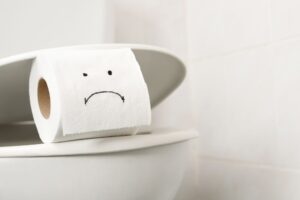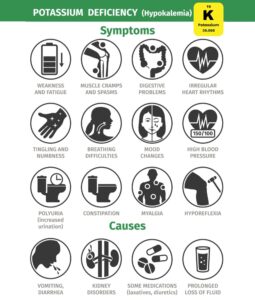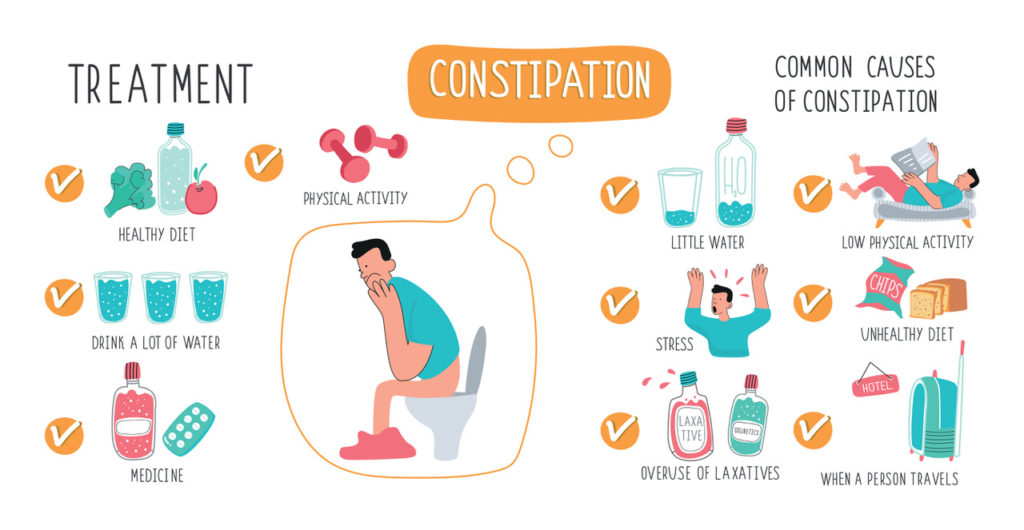What's On This Page?
ToggleMost people think of laxatives and stool softeners as harmless helpers for occasional constipation. After all, they’re sold over-the-counter, right next to vitamins, so how bad could they be? But here’s the shocking truth: these drugs can rob your body of essential nutrients, particularly electrolytes. And when electrolytes go missing, your heart rhythm can become unstable. In some cases, this can be life-threatening.
What These Drugs Do
Stool softeners, such as docusate sodium (Colace), work by pulling water and fats into the stool. This makes the stool softer and easier to pass, but they do not actually stimulate a bowel movement.
Laxatives, on the other hand, are more active and come in several varieties. Osmotic agents (like polyethylene glycol or lactulose) draw water into the intestines, stimulants (such as senna or bisacodyl) trigger the muscles of the bowel to contract, saline types (like magnesium citrate) flush the colon with fluid, and bulk-forming agents (like psyllium) increase stool size so the bowel pushes it along naturally.
-
- Osmotic agents (milk of magnesia, polyethylene glycol/MiraLAX, lactulose) pull water into the intestines.
- Stimulants (senna, bisacodyl/Dulcolax, cascara) directly stimulate bowel contractions.
- Bulk-forming (psyllium/Metamucil, methylcellulose/Citrucel) add fiber to bulk up stool.
- Saline laxatives (magnesium citrate, sodium phosphate) work quickly by flooding the colon with fluid.
While occasional use may not be problematic, frequent or prolonged use sets the stage for nutrient depletion.
 The Drug Mugging Effect
The Drug Mugging Effect
Medications can “mug” your body of vital nutrients. With laxatives and stool softeners, the theft is most obvious with electrolytes:
- Sodium
- Potassium
- Magnesium
- Chloride
- Calcium
- Phosphate
And in the case of stool softeners like docusate, there’s also the risk of depleting fat-soluble vitamins (A, D, E, K) since these require dietary fat for absorption.
- Vitamin A supports vision, immune strength, and skin health.
- Vitamin D regulates calcium, bone health, and immune function.
- Vitamin E protects cells as a powerful antioxidant.
- Vitamin K is essential for blood clotting and strong bones.
Why Electrolytes Matter for Your Heart ❤️
Earlier I listed the electrolytes that are potentially depleted with laxative and stool softener use. Now for more detail: Sodium, potassium, magnesium, chloride, calcium, and phosphate are electrolytes that keep your body’s electrical system in balance. Together, they regulate heartbeat, muscle contraction, nerve signaling, hydration, and even the way your bones and cells maintain structure. So if you have muscle aches or leg cramps, or your weak, it could be due to the drug mugger effect (the drug stealing your electrolytes).
Your heart is an electrical organ. Every beat depends on a delicate balance of sodium, potassium, magnesium, and calcium ions moving in and out of heart cells. If one of these electrolytes is too low, the electrical rhythm will misfire, leading to or exacerbating:
- Palpitations or fluttering sensations
- Dizziness, fainting, or chest pain
- Dangerous arrhythmias like atrial fibrillation or ventricular tachycardia
- In severe cases, sudden cardiac arrest (ie the heart just stops beating which is different than a heart attack)
Here’s a chilling statistic: Studies show that hypokalemia (low potassium which is just one of your electrolytes) is responsible for nearly half of all drug-induced arrhythmias in hospitalized patients. I wonder how many of those people are supported on a stool softener or laxative.

Signs You May Be Running Low
Electrolyte imbalances can sneak up on you. Symptoms include:
- Muscle cramps or spasms
- Headaches or brain fog
- Fatigue (tired but wired feeling)
- Irregular heartbeat
- Salt cravings
- Feeling dehydrated despite drinking water
If you’re experiencing these while taking laxatives or stool softeners daily, it’s not “just stress” — it could be your body’s warning signal.
The Solution: Here’s What You Can Do
One solution is to restore what the drug mugger stole. Depending on severity, this can be as simple as diet changes, or as urgent as a trip to the ER.
- Mild Cases (everyday use, mild symptoms):
- Replenish electrolytes with foods: coconut water, bananas, avocados, sweet potatoes, bone broth, leafy greens.
- Take an electrolyte powder or drink with sodium, potassium, and magnesium (avoid sugary sports drinks). One of my favorites is “Electrolit” Coconut flavor, but there are others. I hate artificial colors – you probably do to. Read the label closely if you’re also trying to avoid FD&C dyes.
- Moderate Cases (persistent use, noticeable symptoms):
- Ask your provider about checking electrolytes with a simple blood test.
- Supplement strategically with balanced electrolyte solutions (oral rehydration salts, or a clean product with no artificial colors).
- Pair fat-soluble vitamin foods (like egg yolks, grass-fed butter, salmon, avocado, leafy greens) with healthy fats for better absorption.
- ⚠️ Severe Cases (chest pain, severe weakness, fainting, irregular heartbeat):
- Skip the coconut water. Head straight to the ER for IV electrolyte replacement and cardiac monitoring. Your heart is not a “wait-and-see” organ.
Strategies to Prevent Future Trouble
- Avoid taking laxatives long-term unless directed by your doctor. If constipation is chronic, look for root causes (thyroid imbalance, low magnesium intake, poor hydration, low fiber diet). Here’s an article you can read next: 7 Impressive Natural Remedies for Chronic Constipation.
- Rotate approaches: Try fiber, probiotics, magnesium citrate, hydration, or lifestyle changes before reaching for daily pills.
- If you must use these drugs regularly, discuss with your provider how to monitor and replace electrolytes.
 Factual Case Highlight: Laxative-Induced Electrolyte Imbalance and Arrhythmia Risk
Factual Case Highlight: Laxative-Induced Electrolyte Imbalance and Arrhythmia Risk
In clinical monitoring and safety data, laxatives have been implicated in serious electrolyte disturbances—particularly hypokalemia (low potassium) and hypomagnesemia (low magnesium)—that raise the risk of dangerous heart rhythm disturbances such as torsades de pointes.
For example, electrolyte disturbances such as low potassium (hypokalemia) and low magnesium (hypomagnesemia) have been documented with laxative abuse, and both are well-established risk factors for torsades de pointes, a dangerous ventricular arrhythmia linked to QT-interval prolongation. If you have 5 extra minutes, read this blog next: 20 Surprising Drug Muggers of Magnesium (And the Silent Health Crisis It Creates).
Experts caution that in patients already taking medications that prolong the QT interval (such as certain antibiotics), excessive laxative use can further raise the risk of life-threatening rhythm disturbances. Warning signs include dizziness, palpitations, fainting, or an irregular heartbeat, all of which warrant immediate medical evaluation.
Although individual case reports are rarer, the mechanistic and safety data clearly connect laxative-induced loss of key electrolytes with arrhythmogenic potential, especially in sensitive or medically complex individuals.
Case Alert: In some patients, laxative overuse has led to low potassium and magnesium- two electrolytes critical for a steady heartbeat. These imbalances are documented risk factors for torsades de pointes, a dangerous ventricular arrhythmia. The medical literature even warns that patients who are on QT‑prolonging medications (think certain antibiotics or antiarrhythmics) face an elevated risk – and should be monitored if laxatives are being used regularly. Among the two most popular medications (and there are others), there are:
-
Azithromycin — an antibiotic prescribed for sinus infections, pneumonia, bronchitis and more.
-
Amiodarone — an antiarrhythmic drug used for atrial fibrillation and a few other irregular heart rhythms. If you take this look it up on my other site drugmuggers.com for more nutrient depletions.
Details on Arrhythmia
Electrolyte depletion can certainly worsen atrial fibrillation (A-fib) in people who already have it, but the more alarming risk with laxative abuse is a different category of arrhythmia: ventricular.
The one doctors fear most is called torsades de pointes. It’s a rare but unstable rhythm that begins in the ventricles (the lower chambers of the heart) when potassium or magnesium levels fall too low. Left unchecked, torsades can quickly spiral into ventricular fibrillation (V-fib), a chaotic rhythm that causes the heart to stop pumping blood, often leading to sudden cardiac death.
So while A-fib may be aggravated by electrolyte shifts, the classic danger from laxative-induced losses of potassium and magnesium is ventricular arrhythmias: torsades de pointes, ventricular tachycardia (V-tach), and ultimately V-fib.
⚠️ Red flag warning: If you develop sudden fainting, severe palpitations, chest pain, or dizziness while using laxatives or stool softeners, treat it as an emergency and seek immediate medical care.
Laxative Use: Do You Use These for Something Different than Constipation?
You’d be surprised to know but people WITHOUT constipation do use, and sometimes misuse laxatives. I think that’s where the danger really escalates for people. Here are some risky (off-label) patterns of use:
- Weight Loss / Eating Disorders
- People with bulimia nervosa or anorexia nervosa sometimes misuse laxatives in the belief that they will block calorie absorption. And here’s an often-overlooked stat: Studies report laxative abuse in 10 – 60% of people with eating disorders – some groups are pill-popping every day to help lose weight. In a recent sample, nearly a third (31%) admitted to laxative use.
I hate to pop that bubble, but somebody has to tell you the truth: In reality, by the time a laxative hits your colon, the calories from it have already been absorbed in your small intestine. The only thing lost is water, electrolytes, and sometimes lean tissue, not fat. Most people who use it for this purpose do so and get no benefit, only risks. This misuse is one of the most common and dangerous patterns, and it’s associated with severe dehydration, hypokalemia, and sudden cardiac death.

The person on the toilet is constipated. Treatment and Causes of constipation in humans. Illustrations of medicines, laxatives, fiber, dumbbells, suitcase, water bottle, person on the couch, junk food
- People with bulimia nervosa or anorexia nervosa sometimes misuse laxatives in the belief that they will block calorie absorption. And here’s an often-overlooked stat: Studies report laxative abuse in 10 – 60% of people with eating disorders – some groups are pill-popping every day to help lose weight. In a recent sample, nearly a third (31%) admitted to laxative use.
- “Cleansing” or “Detox” Trends
- Some people use laxatives as part of fad “detox” regimens, colon cleanses, or weight-loss teas that contain stimulant laxatives like senna or cascara. There’s a lot of bad information on the Internet, and on videos and people sadly get themselves into trouble this way.
- These detox products and bundles that some makers sell are almost always marketed as “natural,” and… I mean… they may very well be “natural,” but even so, they can cause dependence, electrolyte imbalances, rebound constipation and heart problems. Lots of people have wound up in the ER as a result of this nonsense.
- Athletics / Bodybuilding
- Some professional athletes, including wrestlers, gymnasts, and bodybuilders, misuse laxatives to “make weight” or reduce bloating before competition. This is a dangerous practice because the sudden electrolyte shifts can disrupt cardiac rhythm. The rapid water loss may create the illusion of leanness, but in reality it puts significant strain on both the heart and kidneys.
- Chronic Bloating or IBS
- Some people with irritable bowel syndrome or chronic bloating self-medicate long-term with OTC laxatives instead of seeking treatment for the underlying issue (like dysbiosis, SIBO, or food intolerance).
Laxative is used properly for occasional constipation. But laxative misuse (and abuse) is most
Final Thoughts
Laxatives and stool softeners may seem benign, but daily use can quietly drain your body of critical nutrients. Electrolytes are not optional — they are the sparks that keep your heart in rhythm and your muscles functioning. If you’ve been relying on these drugs, take a moment to evaluate your strategy. Sometimes the real cure isn’t in the pill, but in restoring the balance that the pill mugged from you.
Remember, your body isn’t constipated because it’s short on laxatives 😉. Treat the root cause, replenish what’s lost, and keep your heart safe.

Suzy Cohen, has been a licensed pharmacist for over 30 years and believes the best approach to chronic illness is a combination of natural medicine and conventional. She founded her own dietary supplement company specializing in custom-formulas, some of which have patents. With a special focus on functional medicine, thyroid health and drug nutrient depletion, Suzy is the author of several related books including Thyroid Healthy, Drug Muggers, Diabetes Without Drugs, and a nationally syndicated column.
